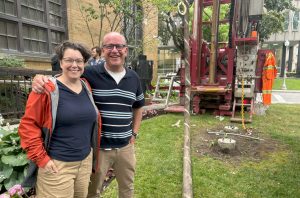Move over American Idol and Canadian Idol, there’s another North American talent search.
Der Idisher Idol is a bit different, however: entrants to this international competition sing in Yiddish. As the rules state, “It is not necessary to know Yiddish to participate; what really matters is that you know its soul!”
In February, Janie Respitz of Montreal was crowned an Idisher Idol, after winning the prize for best interpretation of an existing Yiddish song at the final contest in Mexico City.
In addition to the glory, she took home a US$500 ($666) cash prize.
She performed Kotsk, a song about a small town in Poland, which was the seat of the Kotsker rebbe, the founder of a Hasidic dynasty in the 18th century.
Respitz has no trouble singing or speaking Yiddish; she is, in fact, a scholar of the language and culture.
The Bialik High School graduate holds a master’s degree in Yiddish language and literature and, for the past 25 years, has performed concerts around the world. She has lectured and taught the subject, including at Queen’s University and McGill University, and is on the faculty of KlezKanada, the annual retreat in the Laurentians.
Respitz was among nine finalists, both local and foreign, who were invited to perform at Mexico City’s 600-seat Teatro del Parque Interlomas before a panel of judges and a live audience.
The competition is in its fourth edition, but Respitz only heard about it last year. She submitted a video of her performing Kotsk in September and received word in December that she was in the running.
The competition has two categories: best interpretation of an existing song, either originally in Yiddish or translated from another language, and best original, unpublished song (the music can be existing). High marks were given for stage presence in both.
READ: SOPHIE MILMAN REFLECTS ON YIDDISH GLORY’S GRAMMY NOMINATION
Respitz chose Kotsk because it was little known. In fact, she only heard about it a year earlier.
“The song speaks to me, I felt good with it,” she explained. “Also, I didn’t want to do something that was done so much that the audience would roll their eyes and say, ‘that again.’ ”
A Yiddish song contest in Mexico City may seem odd, but the city has a large Jewish community, many with roots in eastern Europe, much like Montreal.
“Yiddish was taught in the schools and, while it isn’t anymore, there is still a strong affinity with Yiddish,” Respitz said. “When I was studying (Yiddish and Yiddish literature) at the Hebrew University in Jerusalem, two of my professors were from Mexico.”
She was received with great hospitality. “We were invited to a Kabbalat Shabbat and to dinner at a private home. They were very warm,” she said of the competition’s organizers.
The winner for best original song was Louisa Lyne of Malmo, Sweden, who’s also a well-established performer of Yiddish works.






